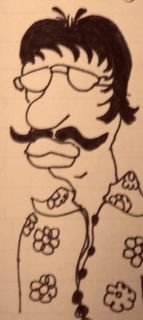When I started talking about doing my super-walk along the Katy Trail one of my friends mentioned the "adventure" aspect of it. A lot of people (me included) wish they had more excitement, more adventure in their lives. I thought about that before I started writing, which has led to work on a more adventure-oriented story.
I wanted light-hearted, Saturday-afternoon-at-the-movies kind of adventure. I came up with an interesting plot device and a group of strange characters (my rule on this project is "if it's not weird, why are you writing it?"). In Chicago I saw my very first episode of DR. WHO (a British Sci-Fi show). It blew my f-ing mind and inspired me to do something different.
What does this have to do with "daddy issues"? Well, it seems that no matter what I do...my personal crap always rears it's ugly head. I don't really have a "genre" that I write in (which pisses some people off, or at least makes them think less of me) but I do have some common themes that always seem to work their way into my writing. One of them is my relationship with me father. So even though I'm supposed to be writing this slightly-cheesy, adventure story I look back and see I've written passages like:
“I can see you’re going to be nothing but impossible about this,” Geoffrey said. “Which only tells me how right I am—you, young man, are in need of a little growing up.”
Though he wouldn’t have admitted it, this stung Bryce deeply. But such a comment from father to son could only sting. Because no matter what a boy might tell the world (or himself), the opinion of his father means an awful lot—the whole world in most cases. Bryce didn’t like the way his father spoke to him sometimes. He didn’t like the way Geoffrey Rogers buried himself in his work and in his factory—but he still loved and respected him. The last thing, the very last thing that Bryce wanted, was his father to think of him as an immature child.
The entry foyer was dead silent in the morning, as it had been for countless years since the death of his mother, Shelby Rogers.
They rarely spoke of her—Bryce or Geoffrey. Each one carried her memory as his own private burden. If only they’d been able to speak about her, they’d realize they shared much more than a common last name and address. Bryce missed her like only a son can miss his mother. He was only six years old when she died of pneumonia. Geoffrey Rogers’s stern, clockwork-like heart ached each year as the leaves began to change color, signifying the return of autumn (the season of her untimely passing).






1 comment:
Uh, the father/son thing pervades Christianity--you come by it honestly.
Post a Comment